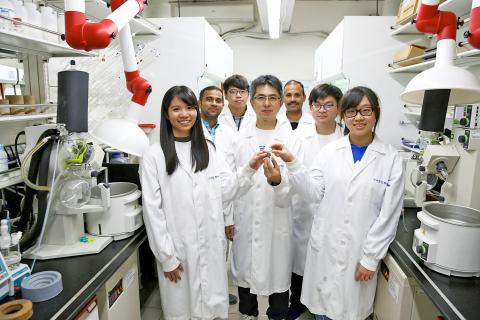Academia Sinica yesterday said that its researchers have developed an antibody testing method for COVID-19 and have made progress synthesizing remdesivir, a medicine that many believe could cure the infection.
The Centers for Disease Control on Tuesday sent serum samples to Academia Sinica of three people who had contact with Taiwan’s first COVID-19 fatality, as part of an effort to determine the source of that infection.
The three had tested negative for RNA viruses, but the centers hoped to discover if they had developed antibodies.

Photo courtesy of Academia Sinica
Test results showed that only one sample had antibodies for COVID-19 and SARS, Academia Sinica Institute of Biomedical Sciences research fellow Lin Yi-ling (林宜玲) said.
The sample was obtained from a Taiwanese businessperson who was not listed as a confirmed case, because their immune system beat the virus, she said.
Little is known about COVID-19, so it is still a mystery whether a person who has recovered from it can contract it again, she added.
The method is useful in tracing the transmission chain of a certain case, Institute of Plant and Microbial Biology Director Wu Shu-hsing (吳素幸) said, but added that testing for RNA viruses tells whether a person contracts COVID-19.
Using molecular biology and genetic engineering, Wu said that she pieced together plasmids — a kind of DNA for expressing antigens — in small templates to make up longer series of plasmids for producing the antigens used to test for COVID-19, SARS and Middle East respiratory syndrome antibodies.
Ordering massive plasmid series from overseas manufacturers takes two to three weeks, Lin said, praising Wu’s team for only needing a week.
After Institute of Biological Chemistry associate research fellow Ho Meng-chiao (何孟樵) purified the nucleocapsid protein of COVID-19 for making reagents, Lin used the western blot method to place the antigens in a serum sample for testing antibody reactions, she said.
Another team led by Institute of Chemistry associate research fellow Chein Rong-jie (陳榮傑) succeeded in synthesizing 100mg of remdesivir in two weeks.
Unable to obtain the raw materials in time, they used materials on hand and molecule synthesis, referencing public-domain literature, to make the drug, which on Thursday was 97 percent as pure as the original, Chein said.
Before the centers tasked them with the mission, Academia Sinica President James Liao (廖俊智) last month formed a task force to speed up the development of antigens, antibodies, drugs and vaccines for COVID-19.
The synthesized drug cannot be used without the consent of the US pharmaceutical firm that manufactures remdesivir, Liao said.
Nonetheless, the achievement showed that Academia Sinica is capable of drug synthesis and could facilitate mass production of the drug after a technology transfer has been completed, he added.

The Ministry of Foreign Affairs (MOFA) yesterday said it is closely monitoring developments in Venezuela, and would continue to cooperate with democratic allies and work together for regional and global security, stability, and prosperity. The remarks came after the US on Saturday launched a series of airstrikes in Venezuela and kidnapped Venezuelan President Nicolas Maduro, who was later flown to New York along with his wife. The pair face US charges related to drug trafficking and alleged cooperation with gangs designated as terrorist organizations. Maduro has denied the allegations. The ministry said that it is closely monitoring the political and economic situation

Conflict with Taiwan could leave China with “massive economic disruption, catastrophic military losses, significant social unrest, and devastating sanctions,” a US think tank said in a report released on Monday. The German Marshall Fund released a report titled If China Attacks Taiwan: The Consequences for China of “Minor Conflict” and “Major War” Scenarios. The report details the “massive” economic, military, social and international costs to China in the event of a minor conflict or major war with Taiwan, estimating that the Chinese People’s Liberation Army (PLA) could sustain losses of more than half of its active-duty ground forces, including 100,000 troops. Understanding Chinese

UNRELENTING: China attempted cyberattacks on Taiwan’s critical infrastructure 2.63 million times per day last year, up from 1.23 million in 2023, the NSB said China’s cyberarmy has long engaged in cyberattacks against Taiwan’s critical infrastructure, employing diverse and evolving tactics, the National Security Bureau (NSB) said yesterday, adding that cyberattacks on critical energy infrastructure last year increased 10-fold compared with the previous year. The NSB yesterday released a report titled Analysis on China’s Cyber Threats to Taiwan’s Critical Infrastructure in 2025, outlining the number of cyberattacks, major tactics and hacker groups. Taiwan’s national intelligence community identified a large number of cybersecurity incidents last year, the bureau said in a statement. China’s cyberarmy last year launched an average of 2.63 million intrusion attempts per day targeting Taiwan’s critical

‘SLICING METHOD’: In the event of a blockade, the China Coast Guard would intercept Taiwanese ships while its navy would seek to deter foreign intervention China’s military drills around Taiwan this week signaled potential strategies to cut the nation off from energy supplies and foreign military assistance, a US think tank report said. The Chinese People’s Liberation Army (PLA) conducted what it called “Justice Mission 2025” exercises from Monday to Tuesday in five maritime zones and airspace around Taiwan, calling them a warning to “Taiwanese independence” forces. In a report released on Wednesday, the Institute for the Study of War said the exercises effectively simulated blocking shipping routes to major port cities, including Kaohsiung, Keelung and Hualien. Taiwan would be highly vulnerable under such a blockade, because it